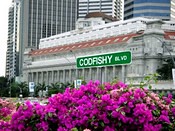A Day to Remember, A Day I Want to Remember in Ministry
 I just came back from a picnic with my cell group and I really must thank God for how well it turned out.
I just came back from a picnic with my cell group and I really must thank God for how well it turned out. I had initially plan to spend time with them and since today is a public holiday, I was really hoping I can get everyone to come and help the cell to bond together... I just felt that since the cell is made of introverted individuals, I needed to try to get everyone bonded together.
But the problem was that although I had intended to have a fellowship, I hadn't been able to get down to confirm things till yesterday evening. And something just told me to maybe try to propose having a picnic at lower pierce reservoir, the same place where my volunteers brought me to the other time for the gathering earlier this year.
But, this being the first time I am organising a cell outing myself, I was so worried about many things... what if only a few came, what if things don't turn out well since we had not even the time to plan the whole thing? what if the weather is no good? what if it is too hot? what if the people find picnic boring? what if the timing to meet is too late? what if everyone is quiet? what if we are attacked by the monkeys there? There were a lot of worries but then I just told myself I am going to pray and commit it into God's hands, trusting He will help me work things out.
So I thank God:
- how everything fell into place nicely including how timely we finished shopping, in time to have another member who drove to come and join us and timely to also pick up another member who was coming from town;
- for the weather, which was cool with cloud cover but yet it did not rain;
- for the amount of food being just right to feed everyone and yet did not cost us a bomb;
- how almost everyone except one came;
- how we were not really pestered by the monkeys;
- how one of the cell members who drove, initially was not able to join us at the beginning of the picnic but later could because his appointment was cancelled, helping us transportation of people and all the groceries, and
- how everyone bonded well with one another and how people had fun with one another doing crazy things like taking silly photos, those "jump in the air" shots, playing frisbee at the reservoir, taking those "everyone lie down with heads forming a circle looking up" shot... everybody just bonded together and even though the cell is made up of introverts, it was amazing seeing the chemistry of how each brought to the gathering different things, one brought with him ideas for activities and games, one brought with him the youthfulness, cheerfulness and humour while the rest just had fun.
I also thank God how a blog entry I have done up for the cell blog has ministered to one friend. Thank you Lord!








